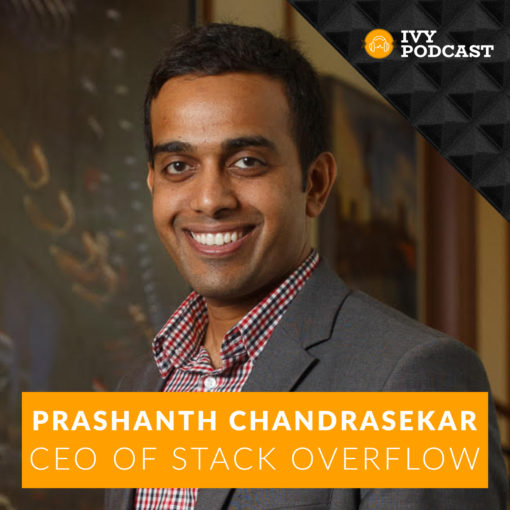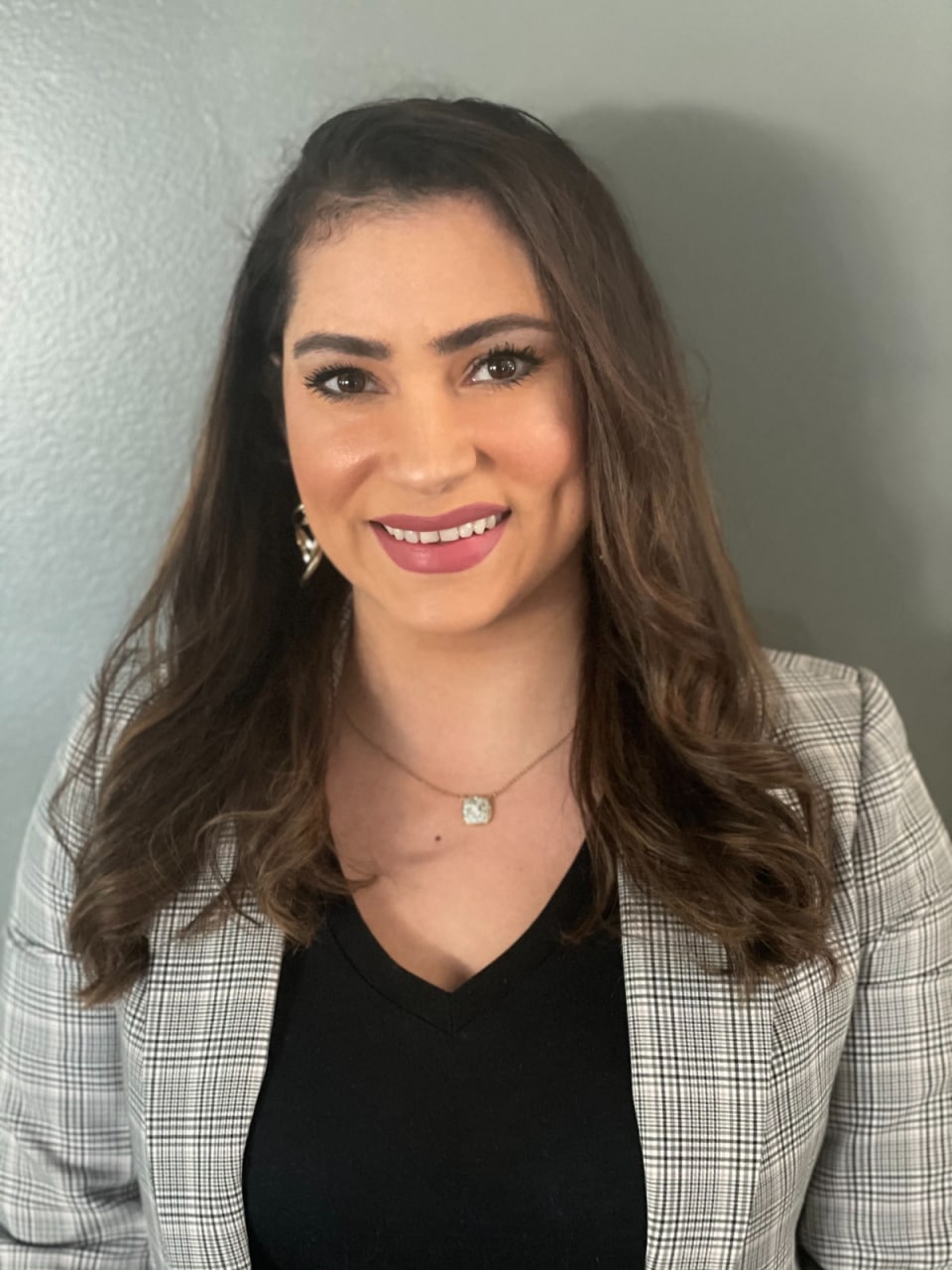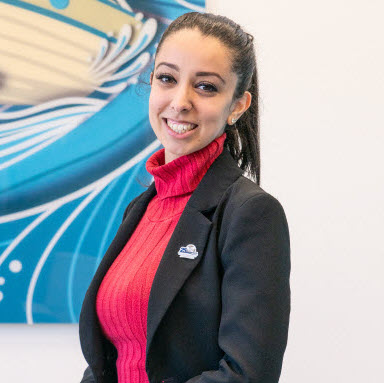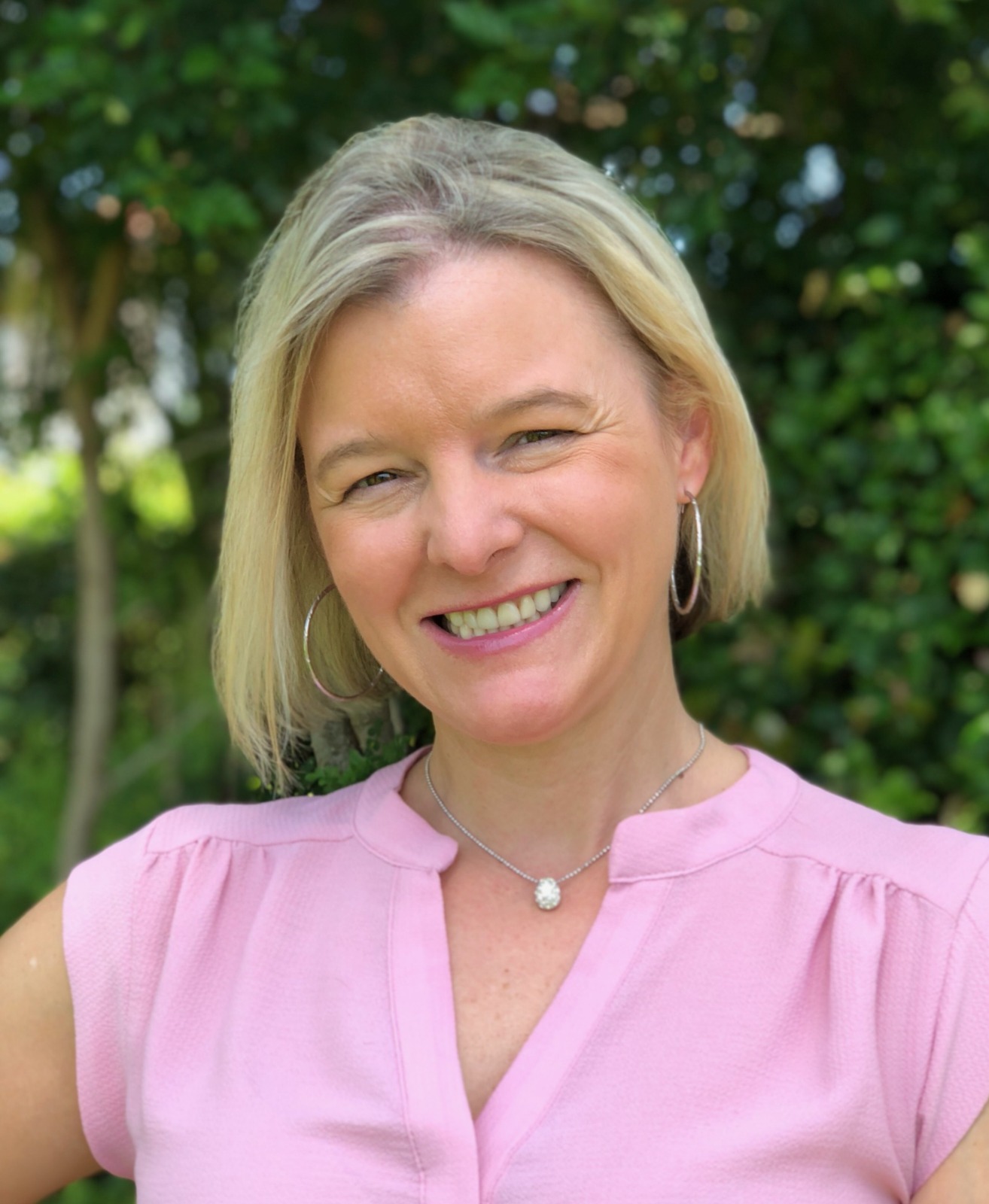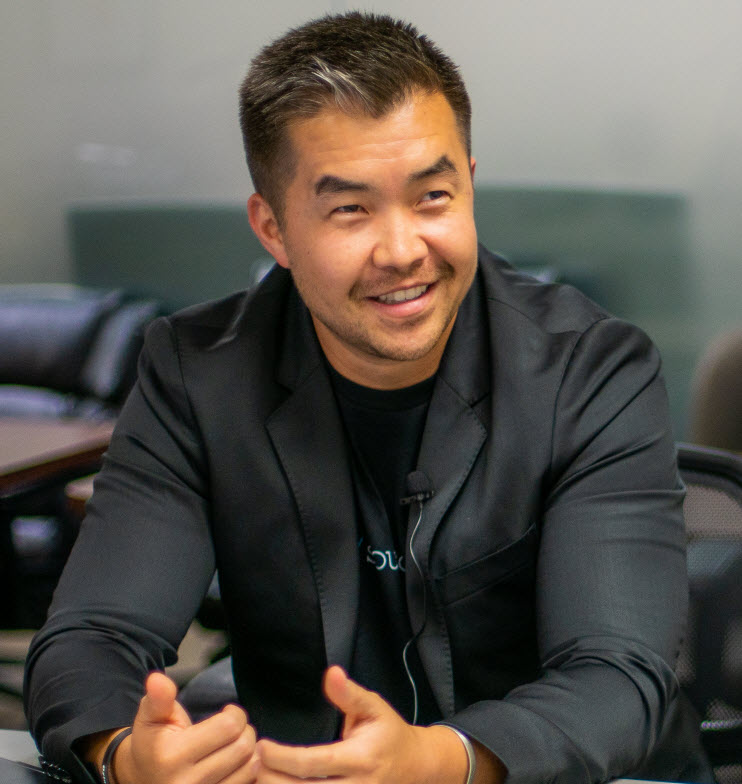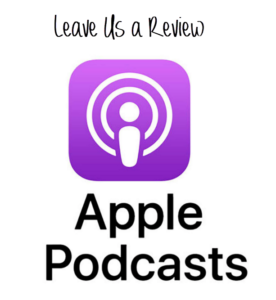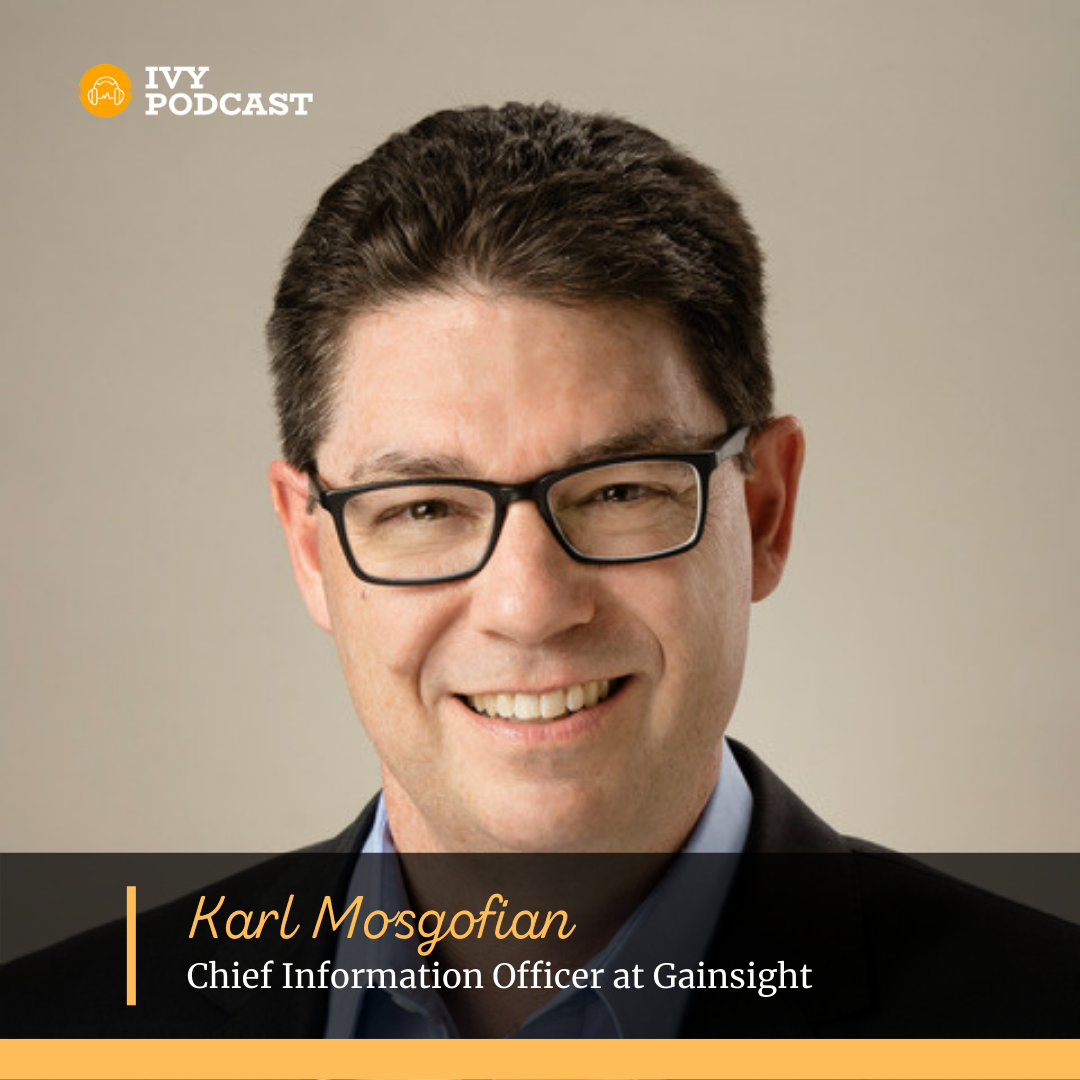
Karl Mosgofian leads the IT & Security team for Gainsight, the leader in Customer Success software. With over 30 years of experience Karl brings a breadth and depth of business and technology understanding. From consulting, to startup adventures, through senior leadership roles at companies like Alta Group, Cadence Design Systems, and Harmonic he has always been passionate about making his customers wildly successful. In addition to his internal role, he loves connecting with our customers and serves as an advocate for IT inside Gainsight. He also volunteers and serves on the Trail Center board, building and maintaining hiking trails in the Bay Area.
Episode transcription:
K: Hi, I'm Karl Mosgofian, CIO at Gainsight. J: Karl, thanks so much for joining us on the heavy podcast today. Can you tell us a little bit more about your backgrounds? Career, where you come from and maybe a little bit more about your role at Gainsight. K: I've been in it for a very long time, maybe 30 plus years at this point. I was CIO previously at a company called Harmonic, a really cool video technology company in San Jose. I've been in the Bay area my whole life, and, prior to that, did a number of different things, both in consulting and corporate IT roles, spent many years at a company called Cadence Design Systems and had a great experience there doing a lot of different things. Mostly in the application space, but also around enterprise architecture. That really helped kind of broaden my portfolio of knowledge and really set me up well to become a CIO. J: That's great. And as far as your current role in your current organization in Gainsight's, wha what is, what, what problem are you guys solving at Gainsight and what falls under your, I mean, I've got security IT operations and applications. So pretty standard. The one thing is that a SAS company sometimes CEO's own the tech ops function and the actually delivery. And I don't have that, thankfully. Because that's quite a big job. The one interesting thing for me about the security aspect of this, is that we are covering the security of the product itself. So I, in the past, have been responsible for security at the network and laptop level. But this is very interesting because we're actually engaged with the engineering team in making sure that our code is secure and that our product is secure. So that's been very interesting. I have enough of a background in software development that's been kind of a natural fit for me, but it's been really interesting to have that in my world and, Gainsight is a company, is solving customer success in all of its sort of permutations. So, customer success is not just about quote unquote making customers happy, but making sure they achieve their outcomes and so more and more, that's becoming a cross-functional effort in companies. So we've got our core software that supports actual customer success departments, but we're also now very involved with the product team. And how do you instrument your software so that you really know what people are doing? And how does sales fit into this and how do all the different departments essentially that are touching the customer and helping the customer achieve their outcomes? Have the information they need and coordinate their actions,to be able to do a really good job of that because that's becoming a major competitive differentiator. J: Right, right. Absolutely. I love that. We can probably spend the entire episode talking just particularly on this particular topic where the product minded, CEOs and CEOs. I think that's how the successful ones really differentiate themselves from the, I guess, the average executive, whereas as a company-wide almost a culture like approach to understanding first, the problem that your customers are facing and then building the product around that. I think that's one of the one of the main recipes for success, as one of the concepts in marketing that I love is the whole Super Mario concept where you start out, there's a little Mario running around. And, as you achieve, you grab the flour and all of this, you become this kind of super character, and that kind of relates to some of the problems that you should be solving for your customers. They're really trying to understand it and then cater the product features and all of that great stuff towards that. I think that's pretty unique. So thanks for kind of that information as far as the background, your role. One of the ways that we say it, that I kind of like is very simply that. Customer success is greater than customer success management as just a succinct way to say that it's bigger than just that particular team of companies that are really successful. Take it as has really almost a company-wide initiative to be more customer centric and more focused on customer outcomes. K: Right, right, right. Absolutely. That's great. J: And that's the type of culture we're trying to foster at our organization as well as we really, invest a lot into understanding the company problem that they're trying to solve and then make them better. I think at that point, you succeed versus trying to just sell your product or your service, without trying to make that connection. I think that's pretty unique. So when we talk about, Building and fostering cultures within the organizations, one of the topics that's, I'm very passionate about this, building that culture of innovation and I'm pretty sure for you guys at Gainsight, that's also in the core continuous innovation, just the overall culture of innovation, right. Tell us a little bit more about what does innovation mean to you and what are some of the strategies that have helped you along the way to really build and foster such a culture of innovation? K: It's interesting because I've been in my career, I've worked at a place like Cadence that had 5,000 people andI worked at a place like Gainsight, which when I came was 500 people. I'm a little bigger now, but I've worked at some smaller startups as well. And it's different. It's very different, right? When you have 50 people, 500 people, 5,000 people. And when you're in a larger companies, there's a lot of talk about how you foster innovation. And I played that kind of role in a larger company where I was in charge of emerging technology research or something like that, and had a lab. I ran an IT lab for a while and had Cadence, which was great fun. In smaller companies, I almost feel like it's a different kind of problem. Especially for me right now, from an IT perspective, all of the departments are still kind of doing their own thing to a large extent, right? When I came in, we started having more centralized services from it, but still there's a lot of autonomy. So there's a ton of innovation that happens in each group, right? Somebody says, hey, I heard about this cool SAS product. I'm going to whip my credit card out and go try it. And so. In some ways, there's less of a problem of how do you try to get people to be innovative and more a problem of how do you make sure people aren't duplicating efforts or stepping on each other's toes? It's almost like to some extent there's too much innovation, right? If you get into a smaller company, that's a startup and has that kind of mentality, trying to channel that good energy in the most constructive way possible, it almost becomes more of the focus. The one thing about how I actually think on the product side and I'm an it guy. So, but on the product side of the house, I've been super impressed with our engineering team and product team and how much innovation we've been able to push out, and so quickly. And I do think that there's a kind of a secret weapon that we have, this is the first company I've ever seen that sort of had this really, at least in this way, which is that our engineering team is all together. I guess the only other example of this is there's a few big companies that have said we're gonna, for the most part, just be like in Cupertino for Apple. But it's a powerful model in our case. They're all in India. And I think that's a little more unusual. And in previous companies, what I've seen a lot of is kind of engineering leadership in the US but then like a ton of people in India doing the work. And what Gainsight does is everything's in India. So the engineering leadership and the engineering teams are all together. and honestly it's so much better. I just see, now that I'm living in it, I'm realizing how much friction there is in that other model. Every other company that I've been at so much time and energy gets spent trying to essentially coordinate geographically disparate engineering teams and the value of having all those people literally in the old days in a building together, soon, hopefully next year we'll get back to that in hydro bod, is just tremendous and I've literally never seen a more productive engineering team. And I think that's a a big part of the reason why. J: Right. No, absolutely. And that's very interesting. And as we talk about innovation, it also starts at the top as well walking the walk, as you empower your teams on your vertical or within the organization, also providing the opportunity for those not only to come with the ideas forward, but also executing and being able to showcase this particular product, idea has legs to that. And then as an organization investing a little bit further into that, I think that also then fosters that culture in general, that anybody has the autonomy to not only bring ideas to life, but actually be able to build upon that. And it's interesting. I'm realizing, as we're talking, there's a theme here, right. Which is autonomy because our engineering teams are also organized. Right as autonomous units. And so, the group that owns this particular set of functionality really owns it from top to bottom, whether it's in it or on the product side. I think that it makes a huge difference. I think when things become giant, monoliths just becomes harder to get anything done, and agility suffers. And so the more you can maintain the right balance, right. If you have too much autonomy, and everybody's just running around doing their own thing, then it's crazy, but you also need to be careful not to become too monolithic. And I think the art of business, I think, is in finding the right, the right balance there. K: Right, right. Absolutely. J: And as we talk about innovation and ideas from your standpoint, and it doesn't necessarily have to be within your organization or your industry, from your perspective, what are the different ideas and trends that you're very excited about personally? What do you think is the next big thing. That's going to happen. Whether that's coming out of current times or in the near future, what are you researching? What are you, what are you passionate about? K: I think there's two things right now. And one is, it's a little bit boring in the sense that we've been saying for a really long time that it's all about data, but it really is all about data. I feel like we're finally starting to see some of the kinds of technologies that actually help us make sense of it. When I got into this business, the problem is we didn't have enough data. And, and I've been here long enough to see us go from not having enough data to having too much data. And so at a certain point, it was like, we're overwhelmed with data. We've got all these inputs, but how do you make some sense of it? And I think people pretty quickly realized this is the problem, right? So then you get business intelligence and data warehouses and ways of visualizing data, but the problem with a lot of those things and they're great technologies and they're vital. but there are a lot of work and, and they kind of require you to figure out where the meaning is and now we're starting to see AI comes in. And actually helps us discover meaning, and cut through some of the noise and figure out what the actual signals are. And I think that's just critical. That's just critical. I mean, if you look at customer data, right? Sentiment analysis and usage data and CRM data that comes out of your systems, right? There's a lot of data there. For a lot of companies, the issue is not, do we have any data about our customers? We have a lot of data, but what do you do with it? And by the way, how do you understand what it really means and how do you make it actionable? Right? How do you actually drive operational processes that say, hey, my customer just went from green to yellow. Because something changed around their usage or our executive connection to them or whatever reason. What's the playbook for how we get them back to a degree. Like let's not wait, especially in SAS businesses, right. But really any subscription business, which almost every company now has in any tech, in any businesses. Is becoming more and more sort of Christian oriented, right? You can't wait till you come up on your three-year renewal to find out that things aren't good. It's way too late. So, you've got to be able to take all those signals, figuring out what they mean and then turn them into action. And so those kinds of technologies to me are super interesting. The other one, is kind of in a completely different direction, but it's just. The whole COVID work from home thing. It has me thinking about different kinds of collaboration technologies and essentially, how do you recreate the kind of experiences we were having in person, in a virtual space. Like Zoom. Nick obviously has been fantastic and those kinds of technologies, things like Slack are extremely important. And I was amazed to see the stats on how our Slack usage went up. In the March, April timeframe. So it's clearly a huge part of making this work. But there are some critical things that aren't happening. and so I'm very intrigued by technologies that try to bridge that gap and try to create those opportunities mainly for less structured communication. I mean, Zoom is like, okay, you've set up a meeting and everybody's in the meeting and you have an agenda and like that's great. But hey, I ran into someone at the coffee station and we had a three-minute conversation that was actually really important, right? Like that's, what's not happening. We got together at an offsite at a sales kickoff. And the point of the sales kickoff was not just to like walk through some PowerPoint presentations. Cause we could have done that on Zoom. Part of the whole point is, we were milling around the lobby and we were having conversations. We were building relationships. There's just a lot that happens in unstructured ways. And that's where I think technology is kind of letting us down right now. But I think that's exactly why there's so much room for innovation there for people to say, well, how do we take things like the technology of gaming, right? And something like a world of Warcraft immersive, space and do our sales kickoff there. Right so that people can literally wander around. They can literally randomly run into people, have a conversation and then move and go somewhere else and have a different random conversation. Like that stuff to me is very exciting and interesting. How do we bring some of those human connections into the virtual world? Because the vaccines are great and everything, but I just think we're not going back to the way things were completely. And so we need to figure out how to make this work better for all of us. J: I love that. Especially, the latter one that you mentioned on the virtual collaboration aspect, because for us, the company, with our bread and butter, we partner with companies to help find and source and onboard very unique, very niche IT talent. And when that happens, a lot of the, whether it's an executive or it's an mid-level engineer, a lot of questions I'm getting is, hey, okay. I started at this company. A company is great, all of that, all the tools, bells and whistles, but everything is remote. And the challenge becomes how do I go? And build relationships with those outside of my little team, outside of my little bubble that I operate on a daily basis. And it's such an interesting point because yeah, it is super challenging because in the previous world you could always wander around, walk around the building offices and run into people. But these days it's almost like. Hey, how do you, how do you ping somebody on Slack without coming across as you know, creepy? So it's an interesting dynamic and I love what you're talking about as far as the trends and technologies that are going to come out of the current time. So it's going to be exciting to see. So as an executive V for you, I would imagine the one of the things that is always at the top of your mind is surrounding yourself with the best talent, with the A-players and whether you're actively recruiting or not. I'm pretty sure you're always on the lookout for. The best people to join your teams. So from that standpoint, share with us any strategies or tips that really help you attract that very niche and top talent to your organization or to your teams. I mean, I think, I feel like it's almost unfair, but Gainsight is such a strong brand that obviously this is outside your control, but the first thing is work for a fantastic company that people really want to come work for, which is sort of cheating. But that certainly doesn't hurt. But I guess what I would say, about that too, is that part of the reason that Gainsight is such an attractive place for people to come to work. Is because it's a company with really strong values and a sense of mission. That's beyond frankly, just making a buck and a company that really lives those values. Our CEO is really out there and very public around, what we're trying to, what we're trying to accomplish in the world. Trying to prove that you can win in business while being human first. That's a pretty powerful message. And it's part of why people want to come work for us. And so, the one thing that is always helpful is to the extent that you can create that kind of values-based culture, and help people understand it. I think that absolutely helps you attract. Attract good people, and so in some ways it's out of your control in some ways it's not out of your control, right? I mean, some of that is corporate level, but some of it is even like, what's the mission statement for your organization, right? There are things you can do to set a tone, that makes you more attractive to folks. J: I love that. And I love the sound of that mainly because we work with organizations of every size, complexity, whatever profit, nonprofit, and a lot of times those that come to us and say. I need to find, I dunno, in site reliability engineer, very unique role, very unique skill set and hard to find, but at the same time it's before us embarking on a journey and go into the database to start recruiting. I think it's very important to first understand the type of culture that's within the organization. Who is the leadership, who is at the top that way, the job becomes a lot easier when we start sourcing and finding that right personality, that would be potentially a good match within the organization. So that leads me to kind of the next question that I have for you is for you, as the CEO of Gainsight, when candidates getting interviewed. I'm sure they go through different levels of assessments, technical assessments, team reviews, and all of that. So when a candidate gets to interview with Karl, give us a glimpse of what does the interview look like? What do you get creative with the interview? Do you keep it pretty traditional? But more importantly, I'm curious, what do you look for in some of the responses when you meet with that candidate? K: Obviously I'm not doing a technical screen. And so I'm not even trying to do that. So I'm focused much more on people, skills, cultural fit, and things like that. I one of the things I've realized over the years is that one of the things that I'm kind of testing people on. Is just how comfortable a conversation can this person have with me, right? Because I'm the CIO, I have this highfalutin title and like, they're going to be a little bit nervous and I kind of want to see how they handle that. I purposely, like, I don't want to have a highly formal conversation with someone. I want to have a fairly loose, open, and much more conversation than an interview. Kind of like we're having, like, okay, I'm going to walk through these 10 questions and I'm gonna write down your answers or something, but let's have some back and forth. Because that's part of what I'm trying to understand is can you have that kind of comfortable conversation, even with someone who's a very senior person, right. Because that's what I'm, I need that. So much of it is about working with our internal customers and that customer relationship is extremely important and it's kind of interesting that all the things that we talk about in terms of customer success. Then have to do with your external customers. Like all those concepts apply internally, right? As it involves working with our internal customers, and it's all equally important, right? Are they getting the outcomes that they intended? Are we communicating well with them? All of those sorts of things are super important. And the fact is that. Look, there's some people whose roles are just super techie and they sit in their cube and they're super techie all day. But honestly, there's almost nothing that you do that doesn't involve collaboration. Either at least within your technical team and quite often outside of that team. And by the way, to one of the things that I really push for my people all the time is outside of our company. I think sometimes it's easy for people to be kind of in a bubble and I'm always really encouraging people. Go find your peer group outside, go find that Slack channel of other people who do the same kind of work that you do. Make an effort to not just have this company be your world, because you're gonna learn so much. And you're going to share, and it's going to be this great experience, as opposed to kind of just getting hunkered down in your cube in your company and kind of losing sight of the bigger picture, you know? And so I'm really interviewing for people skills, communication people can team. Well, one of the things I always say is I don't care how good the individual people on the team are, if they can't work together well, they're just not going to be as effective. And so I need more than just, hey, this person's really smart. I need this person smart and they work well with the rest of the team. J: Right. Thanks for those, those examples. And for anyone who's listening, if you're going to be interviewed with Karl, you have some leg up, but kind of all jokes aside is I love the sound of that because it also sounds like an opportunity for the candidate to really interview you as well into to get to know you, to ask the questions and see, who's in charge who is leading that particular organization or that division, and having that more of a casual conversation, trying to get to know each other almost on a interpersonal level. I think that oftentimes, it gets overlooked, versus just focusing on a particular skill set. And it's also one of my favorite books by Ben Horowitz, Hard Thing About Hard Things. He talks a lot about hiring for strength versus that lack of weakness, which is to me it's so simple, but very powerful. So yeah. It's a great point. You mentioned something that really is good advice for people, everyone in an interview at some point say, do you have any questions for me? So like, think about it. And I had a time like thinking about, and by the way, trying to think of something that only this person can answer. In other words, what's the strategy of the company or whatever. Well, I mean, you can go the website and figure that out, you know? But,I think something that is more cultural is probably a more interesting question, or that has to do with how do we manage our customer relationships here? How do you do that? What's your philosophy of that? I think those kinds of questions spark again a really interesting back and forth that helps both of you get to know each other in terms of, because he really does have to go both ways. You're looking for a job, but you want to make sure this is a good fit for you. K: Of course. Right. J: So, absolutely. I love that. And that's a great example. And as we talk a little bit further about particular skills or something, that's in high demand in this market, that's for you guys for Gainsight, or just in general software development and it, from your standpoint, what are some of the most unique and in demand skill sets that you know, are very challenging to find these days, whether that's a combination of soft and hard skills, curious to get your take on that. K: I think in my current role, I don't need this quite as much, but in the last few years I've found like dev ops is just the toughest period but I I'm also finding right now security is, remains, just a very tough skillset to hire for, there's just so much demand and it almost seems like the growth is hasn't stopped ever, and it's just continuing to go up into the right and every time there's a new story that only it only grows. By the way, for people who may be interested in being part of a CIO networking group here in the Bay area called SYS and some people in that group and the organization overall support a program at Merritt college in Oakland, with a program that was designed to train folks in how to be security operations people. Basically we went out and talked to our membership and said, would be, you have a hard time finding. And people are like, I need people in security, but not just like high-end. You know people, but I need some people to just be operational people. And it's tough because people are either sort of overqualified and then they don't want to do that job or they're under-qualified cause they don't have the basic skillset. And so we partnered with a local community college and created a two year program that was based on what the actual specific skill sets. That those CEOs were saying, these are the things we need. So it's very focused. It's very practical and it's very designed to, you know, train people on exactly the skills that are needed in the real world. So it's not super academic clinically, it's much more practical, kind of training and I can send you a link to put in the show notes. If anyone's interested, they have great interns. And I think in general, it's very helpful to broaden your horizons and look for talent. There's a tendency, I think, to be like everybody, my team has to be a Stanford computer science grad or something, and especially here in Silicon Valley. And what I found in my experience, boy, are there some fantastic people coming out of community colleges, state colleges, they don't have to be big name programs. And by the way, the people who come out of those kinds of programs are super motivated. They don't expect they're whatever the opposite is of a diva, right. They don't expect the world. It just opened up for them because they've got this. Fancy degree for this fancy school. They're like, no, they're ready to roll their sleeves up and work like crazy. And, some of the best hires I've made in my life I've made in the last few years out of smaller schools and just some fantastic people. And I've also been honestly pretty blown away by how strong, a lot of these very young people are, I also still kind of had this bias in my mind, which was like, hey, I don't really want to mess with someone with less than five to 10 years experience. You know what I mean? That you just have that sense that it's just a safer choice, right? And when you ask people how much experience someone needs you they'll always like, I think what I realized is that I was always sort of overdoing it on that. And what I've learned from experiences, there were some people with one year experience, two years, three years, or really, really good, a lot of these young folks, it's really exciting just to see the talent that's coming out. And so it's another thing that I always suggest to people is just, if you're having trouble finding people, broaden your scope, cause there's just so many great people out there. J: I love that. That's great because those are almost daily conversations that I'm having with the hiring managers and other executives for seeking to find these unicorns. And at the end of the day, it's the example you give of a lot of the companies that are very successful in that space. So, willing to take that risk and also, the number of years of experience is just a number and it's an end of the day, how does that particular personality match with what you try to build? I think that's a little bit more important versus having a specific kind of number of years that you had accumulated in that particular field. So that's very exciting. It's interesting too, because in the technology space, the ability to learn is probably more important than what. Because everything changes all the time. Someone may not have that much experience, but if they're a quick learner and they're passionate and they're energetic. Great. Throw them at it. Like, there's a pretty good chance they're actually going to do. That's so great. And definitely gonna make the highlight of this show. Exactly what we just talked about. This is so relevant especially to the current market. Karl last but not least. Well, last two questions I have are: What are your sources of information? What is your source of learning? I don't know whether that's a particular blog that you subscribe to, or there's a Twitter, the profile that you follow share with us, what are your sources? K: Well, I think the first thing I would do is another plug for networking, right? Because honestly, I think some of the best information I get is from my peers. And so first and foremost, if people aren't sort of making the effort to get out there and join those Slack groups and connect to those forums and do that, like, I really urge people to, I think we all probably could do more of that and there's just so much value in that, in terms of more sort of media and stuff, I certainly podcasts now there's more and more great. Content, and that's nice just because you can multitask, so you can be like folding the clothes and listening to the podcast. And it's great. In terms of, I'm also sort of getting more interested in newsletters. I'm finding there's some really good high quality newsletters now. The problem with all the websites and stuff is that there's a lot of duplicate content. So if you check five or six different websites you'll see the same story five or six times. And so it's a little hard again, that's kind of the signal for the noise. The other thing though, that I would sort of suggest to people if they're not doing this is. I love RSS. And I feel like no one even talks about it anymore. And a lot of people probably think it's gone because Google reader went away, but I use a thing called a Feedbin. Almost all of the content that comes sort of from websites, I consume through an RSS reader. It helps me keep track of what I've already seen. I can easily Mark everything as red. Everything comes in the same format, right? So it's all in the same font. There's no ads. it's awesome. Honestly, if more people used RSS, probably places would start to shut it down cause they can't deliver heads through it. But as long as it's sort of this small thing, I think they don't bother closing that loophole. And it's just so much more pleasant and efficient. Way to do it. I couldn't keep up with all of this. If I didn't have that, I also use a mobile app by the way, called Reeder, which I love. It's probably my favorite app and my most heavily used app. So, RSS, if you've never used it or if you used to use it and haven't thought about it in years, consider it, I'm one of them. J: That's great. You used to be a big user of ours says, but somehow that fell off, And seemed like a little bit of an outdated technology, but absolutely. No, I agree. As far as getting that kind of relevant content, exactly what you're looking for and that's pretty cool. And the app that you mentioned, we'll definitely include that in the notes as well, last but not least. What are you currently reading or is there a book that you always recommend to others? And why is that? K: Well, so I was a little late to the party, but I just finally finished The Three-Body Problem by Cixin Liu, which is just as mind-blowing, as everybody said, it was lived up to the hype. One of the things that I thought was so interesting about that was just having this the science fiction book written from a Chinese perspective, a different cultural viewpoint. I really liked that. And so it made me kind of want to seek out other books that are written from a different, a little different point of view. That was really one of the things I really liked about that. I have a book that I love and I always recommend it to everybody. and it's a quick read. It's not a long book. But it's wonderful for perspective, it's called The Victorian Internet by Tom Standage and it's about the Telegraph and, essentially how everything that we've seen with the introduction of the internet was mirrored a long time ago with something that was literally just dots and dashes and those two things seem worlds apart and it's remarkable the similar social impacts. And so it kind of just gives you this perspective on things that I find very helpful when you're in the middle of a technology revolution, people look at something like social media and they're like, nothing has ever existed like this before, and it's going to destroy the world. And it's just interesting to go back and secretly, see people saying the exact same thing about the Telegraph, and how that played out and, and the different aspects of that. So it's a quick read, but I think it's good for perspective. J: Wow. That's really cool. I love these recommendations. Definitely going to highlight them in our notes. Karl, I know how busy you are. Thank you so much for your time today. Very short conversation button, personally learned quite a bit. Happy holidays to you and look forward to staying in touch and perhaps do another episode in the near future. K: Absolutely. This was fun. Thank you so much.
Welcome to Ivy Podcast! On this Executive Leadership Podcast we interview top executives from Fortune 500 with a focus on strategy, innovation, negotiation and everything about leadership.
Our Podcast for Executives features Thought Leaders who share practical insights for effective leadership, continuous innovation and strategy execution.
Ivy Podcast is a rapidly growing Executive Podcast, which covers topics like Hiring and Retention Strategies, Talent Acquisition, Innovation, Digital Transformation and much more.
On this Leadership Podcast, you will find conversations with the most accomplished executives from Fortune 100 companies. We aim to cover a broad range of industries and create a learning platform for the most ambitious and high potential professionals who are looking to learn from the most accomplished Executives on this Business Leadership Podcast.



